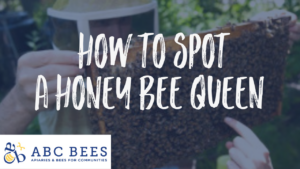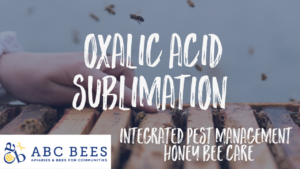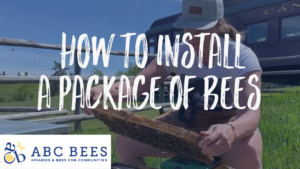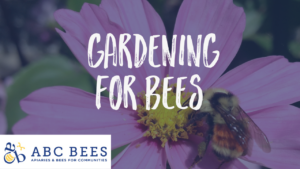Self-Guided Level One Beekeeping Certificate
- Start from the very beginning, no experience is required
- This course meets all bylaw standards; get your permit now
- Build your own seasonal work plan from scratch, based on your location, climate, and desires
- Confidently care for your bees to ensure their health and seasonal success
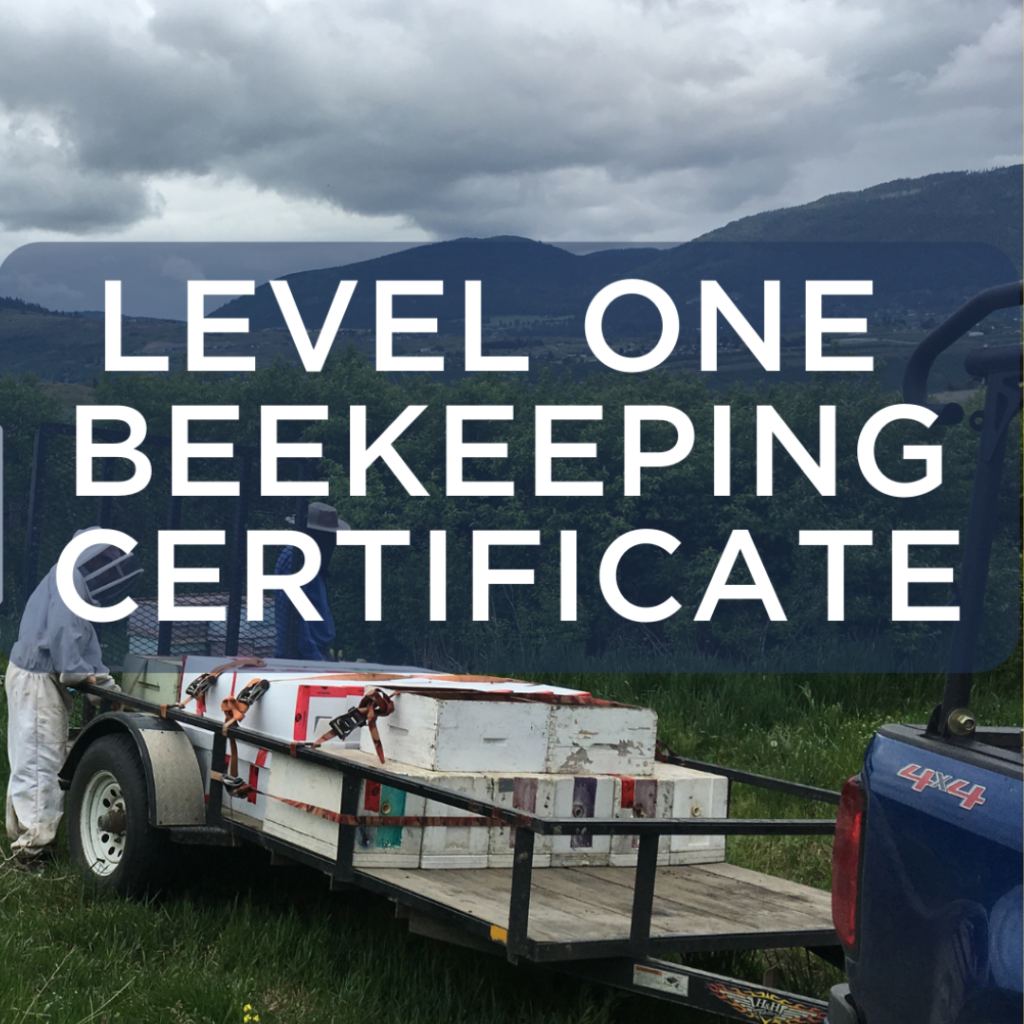
Small Space, Big Impact, No Farm Required
Join bee lovers from across North America who have created productive backyard beehives, launched successful beekeeping businesses, and discovered the joy of producing and sharing their honey and wax products through the ABC Bees Level One Online Certificate.
This comprehensive workshop includes 50+ instructional videos, Q&A chat with Eliese, and support from fellow beekeepers across Canada via the ABC Bees Learning Community, and so much more. Enroll anytime, complete the modules on your own schedule, and create your own seasonal work plan that reflects your climate, region, and needs.
Course Outline
Ten comprehensive modules dig deep into small-scale apiary production.
Course Outline
Module 1: Biology
Time: 3.5 Hours
Discover the intricacies of the honey bee lifecycle, evolution, and the varied roles of each caste. With a focus on workers, drones, and queens, we will pull back the veil to view not just how bees work the way they do, but why.
Course Videos: 6
Module 1 Outcome and Objectives
Identify the characteristics and development of honey bees and honey bee colonies.
The following knowledge, skills, and abilities are used to support this outcome:
- Describe honey bee species’ evolution and distribution
- Describe the honey bee colony
- Identify the basic anatomy, physiology, and genetics of a honey bee
- Explain key milestones in the queen’s growth and development
- List characteristics of drones and worker bees including physical characteristics, developmental stages, and social roles
- Recognize important questions to ask when inspecting beehive health
- Complete a beehive inspection
Module 2: Beginning Beekeeping
Time: 3.5 Hours
Explore some of the tools that all beekeepers need and we start to learn about where you can purchase colonies and how to assess their value. You will learn about bee packages, transporting nucleus colonies, single colonies and how to manage swarms.
Course Videos: 6
Module 2 Outcome and Objectives
Describe the procedures, equipment, and supplies required to begin beekeeping.
The following knowledge, skills, and abilities are used to support this outcome:
- Outline key events in the history of beekeeping
- Identify different ways to purchase and acquire bees including bee packages, nucleus colonies, single colonies, swarms, and cutouts
- Describe where to purchase bees and questions to ask when purchasing bees
- Explain the advantages and disadvantages of the different ways to acquire bees
- List required beekeeping equipment and identify characteristics of safe and effective equipment
- Demonstrate awareness of local regulations and legal requirements for beekeeping
- Recognize important safety considerations when beekeeping
Module 3: Pollen and Nectar
Time: 2 Hours
Explore the nectar flows in your specific geographic location and you will learn about the common nectar plants. You will have an opportunity to build your learning portfolio by conducting your own research and interacting with fellow students on the online community.
Course Videos: 2
Module 3 Outcome and Objectives
Explain the components of a healthy honey bee diet and describe methods to support honey bee nutrition
The following knowledge, skills, and abilities are used to support this outcome:
- Identify seasonal plants for pollinators
- Explain nectar flow
- Describe dietary requirements, foraging, and storage
Module 4: Feeding
Time: 3 Hours
Construct a supplementary feeding plan that will prevent the starvation of the colony and best support bee health and productivity. Learn about wintering bees, pollen supplementation and substitutes, as well as feeding schedules.
Course Videos: 5
Module 4 Outcome and Objectives
Explain different approaches to feeding and different types of feeding products and equipment.
The following knowledge, skills, and abilities are used to support this outcome:
- Identify different types of feed and feeders, and the advantages and disadvantages of each approach
- List the risks of feeding
- Describe pollen supplementation and potential substitutes
Module 5: Hive Placement
Time: 2 Hours
Learn about all the considerations when you are determining the best place to place your hives to ensure the health of your colony. You will also learn about honey bee orientation and more about urban beekeeping.
Course Videos: 5
Module 5 Outcome and Objectives
Justify potential hive locations in relation to honey bee longevity and security.
The following knowledge, skills, and abilities are used to support this outcome:
- Discuss important considerations when placing a hive
- List common threats to hives and identify ways to enhance the security of hives
- Recognize common pests and strategies to reduce pest damage
- Explain bee orientation and when to safely move a hive
- Define drift and list common causes of drift
Module 6: Spring Management
Time: 3 Hours
Learn how to determine when Spring has arrived for your bees, and what management practices are essential to get off to a strong start.
Course Videos: 3
Module 6 Outcome and Objectives
Describe spring beekeeping management practices.
The following knowledge, skills, and abilities are used to support this outcome:
- Outline best practices for performing survival and spring hive inspections
- Identify characteristics of healthy brood
- Recognize brood abnormalities and list potential causes of abnormalities
- Identify characteristics that indicate a colony is queen right
- Recognize signs of a failing or virgin queen, and outline the potential consequences
Module 7: Summer Management
Time: 3 Hours
Create summer management goals and expectations including splitting, supering, or combining colonies. Learn to perform basic hive inspections, identify specific causes for concern, and apply integrated pest management strategies throughout the beekeeping season.
Course Videos: 6
Module 7 Outcome and Objectives
Identify considerations for summer beekeeping management.
The following knowledge, skills, and abilities are used to support this outcome:
- Recognize signs of summer in an apiary
- Identify indicators of spring turnover
- Describe evidence of strong spring buildup
- List characteristics of the three types of queen cells
- Outline the different processes for splitting a colony
- Describe how to maximize wax production when supering a colony
- Recognize when to unite bee colonies, and describe the basic process to unite two colonies
- Outline the process for installing a queen and list the potential risks
Module 8: Fall Management
Time: 3 Hours
Explore the harvesting of honey and how to prepare the colony for winter survival. Seasonal management plan for Fall including simplified honey extraction strategies including foundation and foundationless hive management.
Course Videos: 3
Module 8 Outcome and Objectives
Identify considerations for fall beekeeping management.
The following knowledge, skills, and abilities are used to support this outcome:
- Recognize signs of fall in an apiary
- Describe the process for harvesting honey
- Identify protocol for fall feeding/supplementation and treatment
Module 9: Winter Management
Time: 3 Hours
Learn the role of thermodynamics in winterization strategies, the importance of honey and pollen throughout the winter, as well as winter wrap options, locations and flight paths of bees.
Course Videos: 3
Module 9 Outcome and Objectives
Identify considerations for winter beekeeping management.
The following knowledge, skills, and abilities are used to support this outcome:
- Understand how thermodynamics impact the heat and humidity of the hive
- Describe strategies to keep a hive at an appropriate temperature, level of humidity, and properly ventilated during the winter season
- List considerations when choosing winter hive placement
Module 10: Honey Bee Health
Time: 4 Hours
Complete a management schedule outlining Integrated Pest Management strategies and techniques that will support bee health and productivity throughout the seasons. Learn to explain when pathogens may be present in a colony identifying solutions to treat, restrict, or remove them.
Course Videos: 9
Module 10 Outcome and Objectives
Explain strategies for integrated management of honey bee health.
The following knowledge, skills, and abilities are used to support this outcome:
- Identify various pests and pathogens common to honeybees (Including American Foulbrood, European Foulbrood, Chalkbrood, Nosema apis, Nosema ceranae, Varroa Mites, Tracheal Mites, and Wax Moths)
- Explain pest and pathogen management strategies that will support bee health and productivity throughout the seasons
Capstone Project: Seasonal Management Plan
Have a Plan that Works for You
The goal of this project is to demonstrate your engagement with the course resources and your understanding of course learning outcomes. You have a variety of options to demonstrate that understanding. As you have worked through the course material, you were encouraged to participate in learning activities. These learning activities now serve as the point of reference for your capstone project and as you begin your journey as a beekeeper.
Small Space, Big Impact, No Farm Required
Join bee lovers from across North America who have created productive backyard beehives, launched successful beekeeping businesses, and discovered the joy of producing and sharing their honey and wax products through the ABC Bees Level One Online Certificate.
This comprehensive workshop includes 50+ instructional videos, Q&A chat with Eliese, and support from fellow beekeepers across Canada via the ABC Bees Learning Community, and so much more. Enroll anytime, complete the modules on your own schedule, and create your own seasonal work plan that reflects your climate, region, and needs.
Don’t just take our word for it
Hours of Field Videos and Training Modules in Our Courses
Students Passed Our Level One Beekeeping Certificate
Online Beekeeper Training Courses
Expert Instructors to Learn From in Our Master Academy Program

